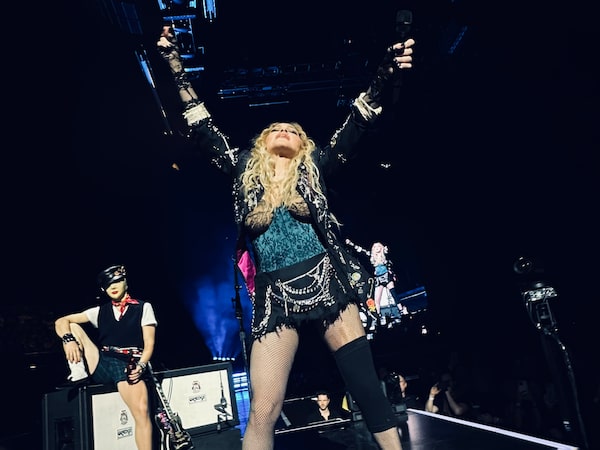
Madonna performs at the Scotiabank Arena in Toronto on Jan. 11.Ricardo Gomes/Supplied
We were heading into lawsuit territory when Madonna hit the stage at Vancouver’s Rogers Arena at 10:01 p.m. on Wednesday. My ticket had indicated an 8:30 p.m. start time. A fun DJ set did begin at the prescribed time – and went on for an hour. But if I was running the concert world, I would have had the guy spin while the heavily Gen X crowd (with a generous smattering of Boomers) trickled in for a show that would definitely start on time, or close to it. Because it was a school night and we’re not the peppy young dynamos we were when Madonna came into our lives back in the ‘80s. Four decades ago, as she reminded us, hours later.
Madonna’s Celebration Tour is a chronicle of the 65-year-old boundary-pusher’s extraordinary career, with a showcase of some of her greatest hits.
The tour made headlines recently – two attendees of a New York show sued after Madonna did not appear until more than two hours after the advertised 8:30 p.m. start time. The suit (which Madonna’s management and concert promoter Live Nation have vowed to “vigorously defend” against) alleges this constituted a breach of contract and “a wanton exercise in false advertising.” It argues that many ticket holders who go to weeknight concerts have to get up early the next day and/or handle family responsibilities.
The plaintiffs have been ridiculed, and going the legal route was a bit much. But they do have a point.
Listen, Madonna is the queen and I bow down to her (and especially to her dancers after the wild show they put on), but Rogers Arena was packed with olds like me. By the time she reached the ‘90s (10:45 p.m.), it was already past my bedtime. It wasn’t until 11:52 p.m. that she got to the song (Ray of Light) that could get me out of any chair even at that hour, and yes, it was worth the wait. But: my knees.
We can’t all be Madonna, prancing around at 65 in what my colleague Brad Wheeler observantly called a “variety of challenging footwear.” (And doing it three nights after falling off a chair in Seattle during one of the show’s elaborately choreographed segments.)
Battling health problems herself, Madonna might do well with an earlier bedtime. This tour, which was supposed to begin in Vancouver last July, had to be postponed after she was hospitalized with a bacterial infection.
At 12:09 a.m., she said her final good-night to Vancouver. I was feeling for all of us working stiffs whose alarms would be going off far too soon, and the parents running up babysitting bills for children who would wake them in a few hours. Not everyone has the luxury of taking a day off to recover from a Madonna concert. Maybe I should have taken a vacation day and then I’d be less grumpy and you’d be reading about something much more important right now.
But, stay with me, I think there is something important to examine here, as the entertainment world, especially theatre, struggles to regain audiences post-pandemic.
Shows, especially during the week, should start earlier.
Some theatres are experimenting with the concept. The National Theatre in London has just launched a six-month trial, starting some shows at 6:30 instead of the usual 7:30 p.m. The early performances were marginally outselling the other midweek shows, The New York Times reported last week.
Yeah, 6:30 p.m. does seem awfully early, but if it gets people to bed at a reasonable hour, maybe they’d be more likely to go.
Some Broadway shows are also trying this. A Hadestown producer told the Times that they moved the Friday curtain up to 7 p.m. because audiences want to go home earlier.
A 7 p.m. start sounds just right. If you knock off work at 5 o’clock, that gives you time to grab dinner and get to the venue, with less chance of having to fight to stay awake after intermission.
Some Canadian theatre companies are in a post-pandemic crisis, as The Globe’s Josh O’Kane and Kelly Nestruck recently reported, with falling subscriber numbers and revenues to match. Some are putting on fewer shows, sometimes pulling previously announced productions altogether.
An earlier start time is not a theatre-crisis panacea, but it’s an idea.
This might sound like a bunch of middle-aged moaning, but consider the typical theatre-going demographic. Middle-aged might be generous. And if people feel this way, they could just stay home. Sure. But many theatre companies rely on older audiences – who allegedly have time and disposable income for such frills – choosing not to stay home, as do many nostalgia acts on tour. Like Madonna.